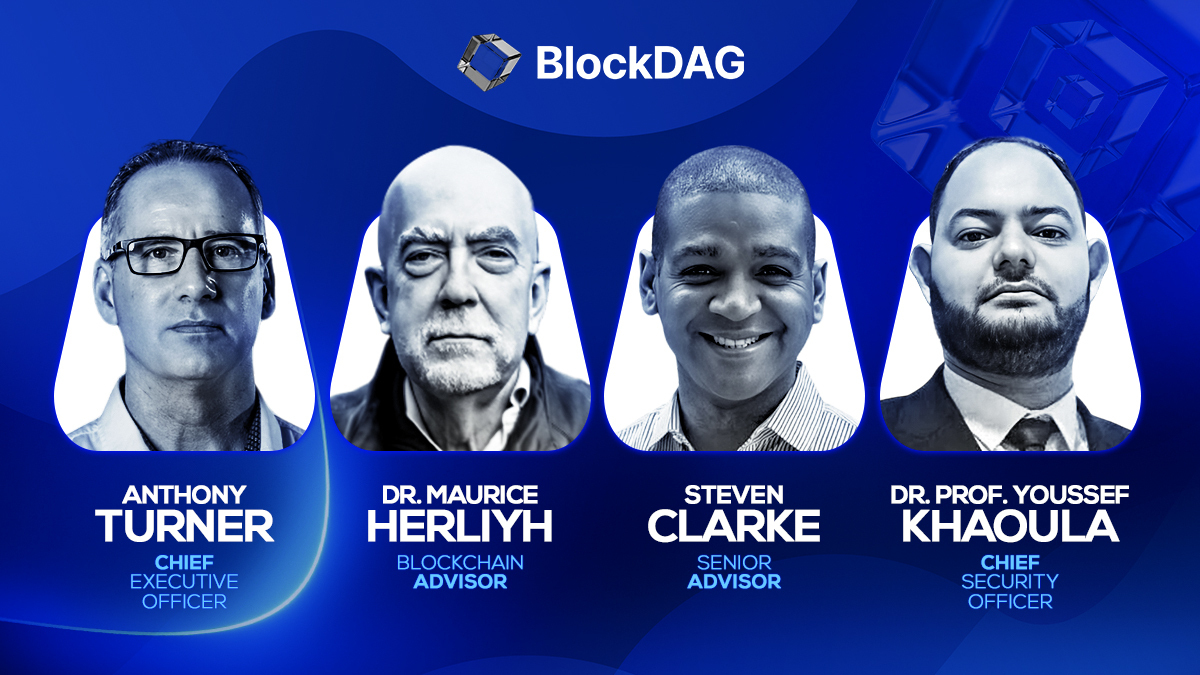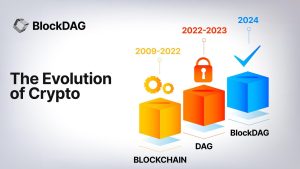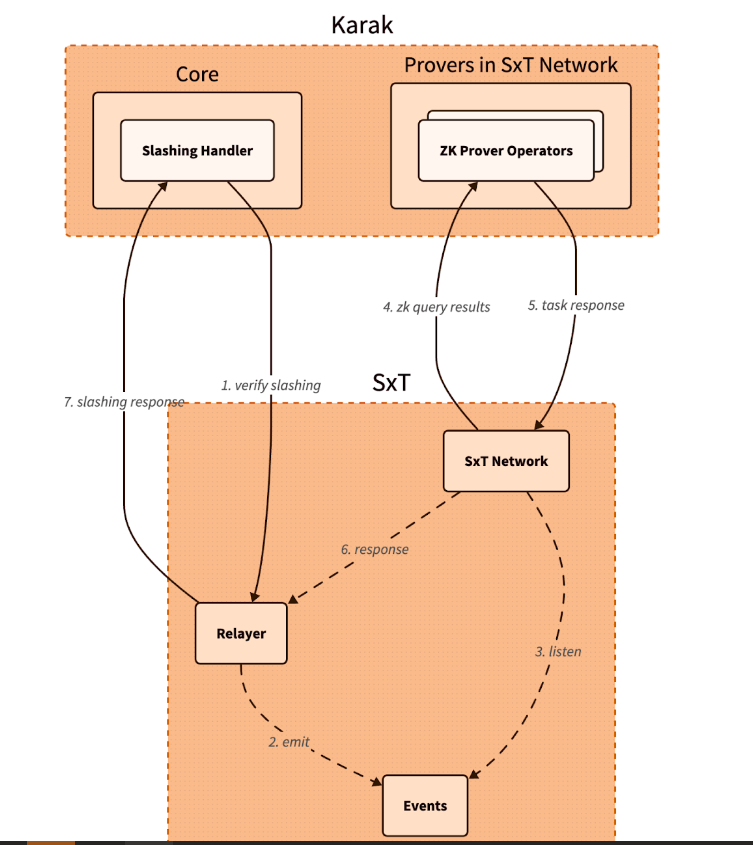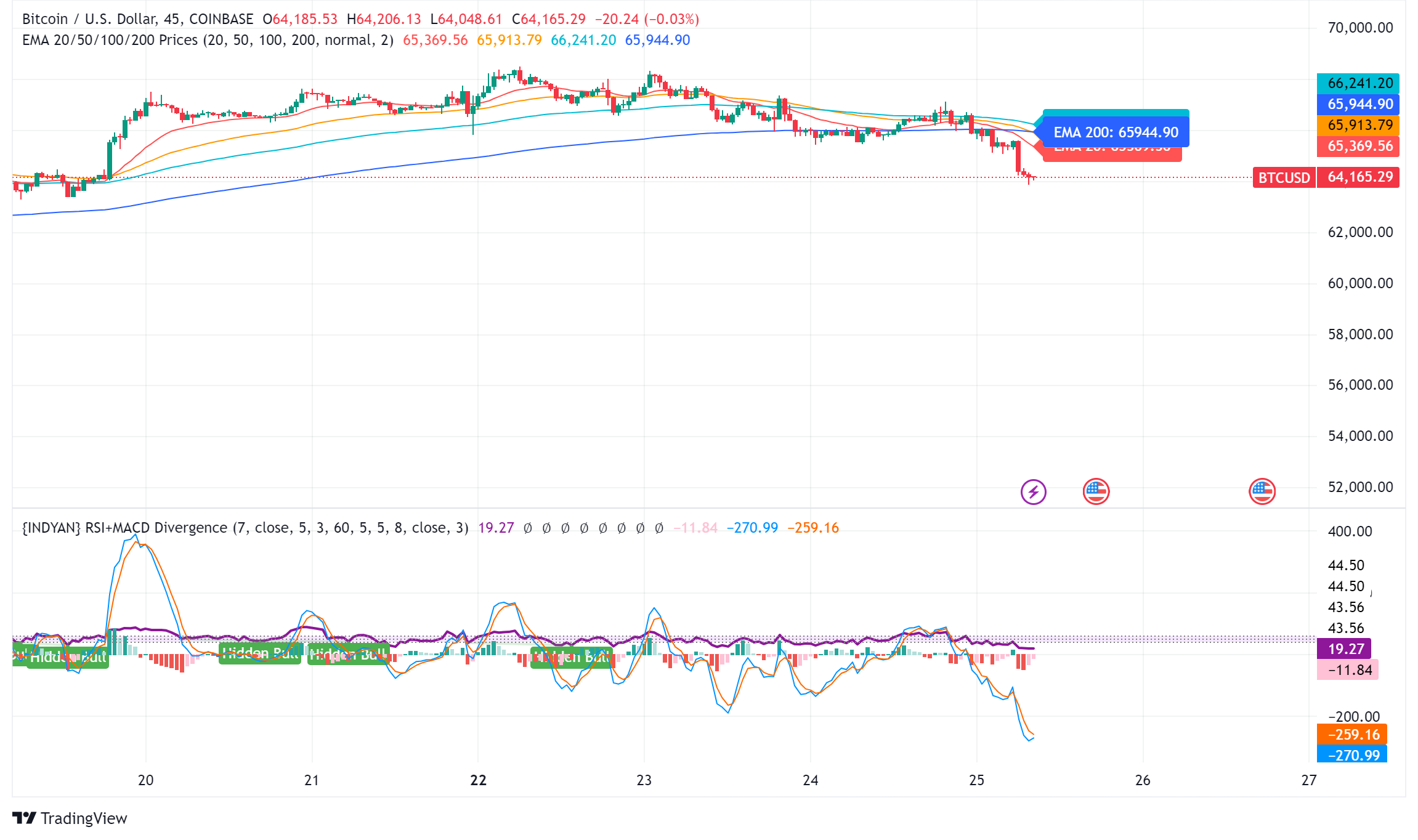Tech
5 Blockchain Trends to Know for 2024 and Beyond

Blockchain has been heralded as one of the game-changing technologies of the 21st century, poised to disrupt industries and transform the way the world shares money and information.
Fifteen years after its debut with the advent of Bitcointhe blockchain revolution has yet to fully materialize.
Instead, blockchain – like most new technologies – is advancing in fits and starts. Technology is bringing radical changes and enabling new business models in some industries, while faltering in others.
Technology experts, industry analysts, and numerous reports over the past year have predicted much the same thing. But they also point out that there is, in fact, a lot of forward momentum.
What’s on the horizon for 2024 and beyond? Blockchain Projects Will Continue to Advance Decentralized Finance (DeFi), especially cryptocurrency, where the technology had its great success and continues to shine. But blockchain progress is also expected in other sectors. Major trends include the following.
1. Growth of DeFi
According to analysts and industry research, interest and investment in blockchain remains strongest in the financial sector.
“We have definitely seen cryptocurrency emerge as the killer app for blockchain,” said Avivah Litan, an analyst at Gartner.
But Litan said it’s not just the cryptocurrency market, which has emerged since the arrival of Bitcoin in 2009, that is using this technology. Established financial institutions also use it, considering it a key component to modernize their infrastructure.
“They are using blockchain for more transparent movement of assets and fractionation of assets,” Litan said, adding that blockchain is a great technology for both real-time tracking and settlement.
“Global Blockchain in Banking and Financial Services Market Report 2023” by ReportLinker detailed the increase in investments, calculating that the global blockchain banking and financial services market grew from $1.89 billion in 2022 to $3.07 billion in 2023. The report sized the market based on the revenues obtained from entities offering both public and private blockchains and other blockchain services in banking and financial services.
These numbers indicate what lies ahead, said Lata Varghese, managing director and leader of the digital assets and blockchain practice at consultancy Protiviti. “The future of assets is digital,” she said.
Cryptocurrency setbacks could have a long-term positive impact on other blockchain applications.
2. Fraud and corruption dampen interests
While the financial sector continues to invest in blockchain technology, the sector is also facing increasing scrutiny and skepticism following a wave of negative news over the past two years.
There was the collapse of Terra, an open source blockchain platform in May 2022.
Then came the widely publicized collapse of FTX, at one point the third-largest cryptocurrency exchange, in late 2022. It was followed by the arrest of founder and former CEO Sam Bankman-Fried on various charges, including fraud. In early 2023, cryptocurrency lender Genesis Global Capital declared bankruptcy.
Anecdotal evidence is supported by statistics. The FBI’s “2022 Internet Crime Report” found an increase in cryptocurrency investment fraud from $907 million in 2021 to $2.57 billion in 2022, an increase of 183%. Then in 2023, the FBI reported an increase in cryptocurrency investment scams, companies falsely claiming the ability to recover lost cryptocurrency investments, and fake non-fungible tokens (NFTs) offers that have drained people’s cryptocurrency wallets.
This type of news has an impact, Litan said.
“There is still innovation, but it is stifling adoption,” he added. “It affects the whole industry. People don’t get excited anymore. It just drives them away.”
3. Legal repression
Regulators and lawmakers are reacting in response to crime and disorder.
Evidence in point: the legal actions taken last March by the U.S. Securities and Exchange Commission, which filed charges against cryptocurrency entrepreneur Justin Sun and three of his wholly owned subsidiaries for the unregistered offering and sale of securities of cryptocurrencies. The SEC also accused Sun and his companies of fraudulently manipulating the secondary market for the cryptocurrency token TRON (TRX) and orchestrating a scheme to pay celebrities to advertise TRX and another token, BitTorrent (BTT) without disclosing the their compensation. The SEC also charged eight celebrities with illegally promoting TRX and BTT without disclosing whether they received compensation for doing so and the amount of their compensation.
In February, the SEC accused Payward Ventures Inc. and Payward Trading Ltd. (both known as Kraken) of failing to register the offer and sale of their crypto asset staking-as-a-service program, a consensus mechanism for blockchain. Kraken agreed to pay $30 million to settle the SEC charges.
This came just a month after the SEC accused cryptocurrency platform Nexo Capital of failing to register the offer and sale of its retail cryptocurrency lending product. Nexo agreed to pay $45 million in penalties.
The agency has initiated numerous other actions against unregistered cryptocurrency products for the remainder of 2023. However, in January 2024, it approved the sale of exchange-traded products with spot bitcoin, a new type of investment vehicle that holds bitcoin and can be traded on the stock market. .
The SEC is not the only entity taking action. U.S. lawmakers at both the state and federal levels have proposed or filed legislation aimed not only at the cryptocurrency market but also blockchain as a technology.
Among those actions is a move made in March by U.S. Rep. Tom Emmer, R-Minn. The co-chair of the Congressional Blockchain Caucus introduced the Blockchain Regulatory Certainty Act. The bill, which passed in committee but still needs to be voted on by the full House, seeks to create legal clarity blockchain developers and service providers that do not hold or manage consumer funds, essentially stipulating that they should not be considered money transmitters subject to stringent regulation.
Meanwhile, several US states have blockchain and cryptocurrency-related legislation pending in 2024.
4. Corporate investments in blockchain
Despite all the recent turmoil in the cryptocurrency industry, business executives are still interested in blockchain, industry analysts said.
They explored how blockchain can be used to create more effective, efficient and secure platforms for various business needs, including identity and access management, supply chain management, smart contracts and document management and verification .
However, most organizations are only exploring ideas or experimenting with blockchain for such uses.
“I see people are still interested in this, but we don’t see adoption taking off yet,” said Seth Robinson, vice president of industry research at CompTIA, an IT industry association.
Robinson said executives in most industries, particularly those outside the financial sector, have yet to see any platform built with blockchain that justifies the cost of replacing the systems they already have.
He said he expects it business use of blockchain to accelerate the moment software vendors find ways to use it to dramatically improve their products or to create new products and services that significantly help organizations.
“Vendors will have to demonstrate why the blockchain-based solution is better – and that it is much better – that it is worth eliminating and replacing what [companies] have in place,” he said.
However, there are some areas where business leaders are further along in their experiments or use of blockchain.
Some organizations use blockchain for compliance, particularly in the healthcare industry environmental, social and governanceor to bring more transparency to their supply chains. For example, some use blockchain for provenance to ensure that raw materials come from acceptable regions.
5. NFTs for businesses
While executives may not yet see the value of using blockchain for many business processes, more and more people are embracing it as part of the token-based online economy. Specifically, they are creating new revenue streams by selling digital products and assets via NFTs.
“This is where a lot of the innovation has happened,” Varghese said.
The potential size of the market is staggering. In a 2021 research note, Morgan Stanley estimated this metaverse games and NFTs could represent a $56 billion revenue opportunity by 2030 for the luxury market alone.
Meanwhile, professional services firm Deloitte addressed the potential of NFTs for businesses in its 2022 report, “Companies Using NFTs: How NFTs Could Fit Your Business and What to Look For,” writing that companies are just starting to scratch the surface of the technology.
Deloitte went on to conclude: “The more companies develop and test new use cases, the clearer it seems that NFTs in their many forms – current and future – could fundamentally change the way we engage in and record the transfer of rights and obligations digital”. , a development that could redefine the very nature and boundaries of modern commerce.”
Mary K. Pratt is an award-winning freelance journalist specializing in covering enterprise IT and cybersecurity management.
Tech
Harvard Alumni, Tech Moguls, and Best-Selling Authors Drive Nearly $600 Million in Pre-Order Sales

BlockDAG Network’s history is one of innovation, perseverance, and a vision to push the boundaries of blockchain technology. With Harvard alumni, tech moguls, and best-selling authors at the helm, BlockDAG is rewriting the rules of the cryptocurrency game.
CEO Antony Turner, inspired by the successes and shortcomings of Bitcoin and Ethereum, says, “BlockDAG leverages existing technology to push the boundaries of speed, security, and decentralization.” This powerhouse team has led a staggering 1,600% price increase in 20 pre-sale rounds, raising over $63.9 million. The secret? Unparalleled expertise and a bold vision for the future of blockchain.
Let’s dive into BlockDAG’s success story and find out what the future holds for this cryptocurrency.
The Origin: Why BlockDAG Was Created
In a recent interview, BlockDAG CEO Antony Turner perfectly summed up why the market needs BlockDAG’s ongoing revolution. He said:
“The creation of BlockDAG was inspired by Bitcoin and Ethereum, their successes and their shortcomings.
If you look at almost any new technology, it is very rare that the first movers remain at the forefront forever. Later incumbents have a huge advantage in entering a market where the need has been established and the technology is no longer cutting edge.
BlockDAG has done just that: our innovation is incorporating existing technology to provide a better solution, allowing us to push the boundaries of speed, security, and decentralization.”
The Present: How Far Has BlockDAG Come?
BlockDAG’s presale is setting new benchmarks in the cryptocurrency investment landscape. With a stunning 1600% price increase over 20 presale lots, it has already raised over $63.9 million in capital, having sold over 12.43 billion BDAG coins.
This impressive performance underscores the overwhelming confidence of investors in BlockDAG’s vision and leadership. The presale attracted over 20,000 individual investors, with the BlockDAG community growing exponentially by the hour.

These monumental milestones have been achieved thanks to the unparalleled skills, experience and expertise of BlockDAG’s management team:
Antony Turner – Chief Executive Officer
Antony Turner, CEO of BlockDAG, has over 20 years of experience in the Fintech, EdTech, Travel and Crypto industries. He has held senior roles at SPIRIT Blockchain Capital and co-founded Axona-Analytics and SwissOne. Antony excels in financial modeling, business management and scaling growth companies, with expertise in trading, software, IoT, blockchain and cryptocurrency.
Director of Communications
Youssef Khaoulaj, CSO of BlockDAG, is a Smart Contract Auditor, Metaverse Expert, and Red Team Hacker. He ensures system security and disaster preparedness, and advises senior management on security issues.

advisory Committee
Steven Clarke-Martin, a technologist and consultant, excels in enterprise technology, startups, and blockchain, with a focus on DAOs and smart contracts. Maurice Herlihy, a Harvard and MIT graduate, is an award-winning computer scientist at Brown University, with experience in distributed computing and consulting roles, most notably at Algorand.
The Future: Becoming the Cryptocurrency with the Highest Market Cap in the World
Given its impressive track record and a team of geniuses working tirelessly behind the scenes, BlockDAG is quickly approaching the $600 million pre-sale milestone. This crypto powerhouse will soon enter the top 30 cryptocurrencies by market cap.
Currently trading at $0.017 per coin, BlockDAG is expected to hit $1 million in the coming months, with the potential to hit $30 per coin by 2030. Early investors have already enjoyed a 1600% ROI by batch 21, fueling a huge amount of excitement around BlockDAG’s presale. The platform is seeing significant whale buying, and demand is so high that batch 21 is almost sold out. The upcoming batch is expected to drive prices even higher.

Invest in BlockDAG Pre-Sale Now:
Pre-sale: https://purchase.blockdag.network
Website: https://blockdag.network
Telegram: https://t.me/blockDAGnetwork
Discord: Italian: https://discord.gg/Q7BxghMVyu
No spam, no lies, just insights. You can unsubscribe at any time.
Tech
How Karak’s Latest Tech Integration Could Make Data Breaches Obsolete

- Space and Time uses zero-knowledge proofs to ensure secure and tamper-proof data processing for smart contracts and enterprises.
- The integration facilitates faster development and deployment of Distributed Secure Services (DSS) on the Karak platform.
Karak, a platform known for its strong security capabilities, is enhancing its Distributed Secure Services (DSS) by integrating Space and Time as a zero-knowledge (ZK) coprocessor. This move is intended to strengthen trustless operations across its network, especially in slashing and rewards mechanisms.
Space and Time is a verifiable processing layer that uses zero-knowledge proofs to ensure that computations on decentralized data warehouses are secure and untampered with. This system enables smart contracts, large language models (LLMs), and enterprises to process data without integrity concerns.
The integration with Karak will enable the platform to use Proof of SQL, a new ZK-proof approach developed by Space and Time, to confirm that SQL query results are accurate and have not been tampered with.
One of the key features of this integration is the enhancement of DSS on Karak. DSS are decentralized services that use re-staked assets to secure the various operations they provide, from simple utilities to complex marketplaces. The addition of Space and Time technology enables faster development and deployment of these services, especially by simplifying slashing logic, which is critical to maintaining security and trust in decentralized networks.

Additionally, Space and Time is developing its own DSS for blockchain data indexing. This service will allow community members to easily participate in the network by running indexing nodes. This is especially beneficial for applications that require high security and decentralization, such as decentralized data indexing.
The integration architecture follows a detailed and secure flow. When a Karak slashing contract needs to verify a SQL query, it calls the Space and Time relayer contract with the required SQL statement. This contract then emits an event with the query details, which is detected by operators in the Space and Time network.
These operators, responsible for indexing and monitoring DSS activities, validate the event and route the work to a verification operator who runs the query and generates the necessary ZK proof.
The result, along with a cryptographic commitment on the queried data, is sent to the relayer contract, which verifies and returns the data to the Karak cutter contract. This end-to-end process ensures that the data used in decision-making, such as determining penalties within the DSS, is accurate and reliable.
Karak’s mission is to provide universal security, but it also extends the capabilities of Space and Time to support multiple DSSs with their data indexing needs. As these technologies evolve, they are set to redefine the secure, decentralized computing landscape, making it more accessible and efficient for developers and enterprises alike. This integration represents a significant step towards a more secure and verifiable digital infrastructure in the blockchain space.
Website | X (Twitter) | Discord | Telegram
No spam, no lies, just insights. You can unsubscribe at any time.
Tech
Cryptocurrency Payments: Should CFOs Consider This Ferrari-Approved Trend?

Iconic Italian luxury carmaker Ferrari has announced the expansion of its cryptocurrency payment system to its European dealer network.
The move, which follows a successful launch in North America less than a year ago, raises a crucial question for CFOs across industries: Is it time to consider accepting cryptocurrency as a form of payment for your business?
Ferrari’s move isn’t an isolated one. It’s part of a broader trend of companies embracing digital assets. As of 2024, we’re seeing a growing number of companies, from tech giants to traditional retailers, accepting cryptocurrencies.
This change is determined by several factors:
- Growing mainstream adoption of cryptocurrencies
- Growing demand from tech-savvy and affluent consumers
- Potential for faster and cheaper international transactions
- Desire to project an innovative brand image
Ferrari’s approach is particularly noteworthy. They have partnered with BitPay, a leading cryptocurrency payment processor, to allow customers to purchase vehicles using Bitcoin, Ethereum, and USDC. This satisfies their tech-savvy and affluent customer base, many of whom have large digital asset holdings.
Navigating Opportunities and Challenges
Ferrari’s adoption of cryptocurrency payments illustrates several key opportunities for companies considering this move. First, it opens the door to new customer segments. By accepting cryptocurrency, Ferrari is targeting a younger, tech-savvy demographic—people who have embraced digital assets and see them as a legitimate form of value exchange. This strategy allows the company to connect with a new generation of affluent customers who may prefer to conduct high-value transactions in cryptocurrency.
Second, cryptocurrency adoption increases global reach. International payments, which can be complex and time-consuming with traditional methods, become significantly easier with cryptocurrency transactions. This can be especially beneficial for businesses that operate in multiple countries or deal with international customers, as it potentially reduces friction in cross-border transactions.
Third, accepting cryptocurrency positions a company as innovative and forward-thinking. In today’s fast-paced business environment, being seen as an early adopter of emerging technologies can significantly boost a brand’s image. Ferrari’s move sends a clear message that they are at the forefront of financial innovation, which can appeal to customers who value cutting-edge approaches.
Finally, there is the potential for cost savings. Traditional payment methods, especially for international transactions, often incur substantial fees. Cryptocurrency transactions, on the other hand, can offer lower transaction costs. For high-value purchases, such as luxury cars, these savings could be significant for both the business and the customer.
While the opportunities are enticing, accepting cryptocurrency payments also presents significant challenges that businesses must address. The most notable of these is volatility. Cryptocurrency values can fluctuate dramatically, sometimes within hours, posing potential risk to businesses that accept them as payment. Ferrari addressed this challenge by implementing a system that instantly converts cryptocurrency received into traditional fiat currencies, effectively mitigating the risk of value fluctuations.
Regulatory uncertainty is another major concern. The legal landscape surrounding cryptocurrencies is still evolving in many jurisdictions around the world. This lack of clear and consistent regulations can create compliance challenges for companies, especially those operating internationally. Companies must remain vigilant and adaptable as new laws and regulations emerge, which can be a resource-intensive process.
Implementation costs are also a significant obstacle. Integrating cryptocurrency payment systems often requires substantial investment in new technology infrastructure and extensive staff training. This can be especially challenging for small businesses or those with limited IT resources. The costs are not just financial; a significant investment of time is also required to ensure smooth implementation and operation.
Finally, security concerns loom large in the world of cryptocurrency transactions. While blockchain technology offers some security benefits, cryptocurrency transactions still require robust cybersecurity measures to protect against fraud, hacks, and other malicious activity. Businesses must invest in robust security protocols and stay up-to-date on the latest threats and protections, adding another layer of complexity and potential costs to accepting cryptocurrency payments.
Strategic Considerations for CFOs
If you’re thinking of following in Ferrari’s footsteps, here are the key factors to consider:
- Risk Assessment: Carefully evaluate potential risks to your business, including financial, regulatory, and reputational risks.
- Market Analysis: Evaluate whether your customer base is significantly interested in using cryptocurrencies for payments.
- Technology Infrastructure: Determine the costs and complexities of implementing a cryptographic payment system that integrates with existing financial processes.
- Regulatory Compliance: Ensure that cryptocurrency acceptance is in line with local regulations in all markets you operate in. Ferrari’s gradual rollout demonstrates the importance of this consideration.
- Financial Impact: Analyze how accepting cryptocurrency could impact your cash flow, accounting practices, and financial reporting.
- Partnership Evaluation: Consider partnering with established crypto payment processors to reduce risk and simplify implementation.
- Employee Training: Plan comprehensive training to ensure your team is equipped to handle cryptocurrency transactions and answer customer questions.
While Ferrari’s adoption of cryptocurrency payments is exciting, it’s important to consider this trend carefully.
A CFO’s decision to adopt cryptocurrency as a means of payment should be based on a thorough analysis of your company’s specific needs, risk tolerance, and strategic goals. Cryptocurrency payments may not be right for every business, but for some, they could provide a competitive advantage in an increasingly digital marketplace.
Remember that the landscape is rapidly evolving. Stay informed about regulatory changes, technological advancements, and changing consumer preferences. Whether you decide to accelerate your crypto engines now or wait in the pit, keeping this payment option on your radar is critical to navigating the future of business transactions.
Was this article helpful?
Yes No
Sign up to receive your daily business insights
Tech
Bitcoin Tumbles as Crypto Market Selloff Mirrors Tech Stocks’ Plunge

The world’s largest cryptocurrency, Bitcoin (BTC), suffered a significant price decline on Wednesday, falling below $65,000. The decline coincides with a broader market sell-off that has hit technology stocks hard.
Cryptocurrency Liquidations Hit Hard
CoinGlass data reveals a surge in long liquidations in the cryptocurrency market over the past 24 hours. These liquidations, totaling $220.7 million, represent forced selling of positions that had bet on price increases. Bitcoin itself accounted for $14.8 million in long liquidations.
Ethereum leads the decline
Ethereal (ETH), the second-largest cryptocurrency, has seen a steeper decline than Bitcoin, falling nearly 8% to trade around $3,177. This decline mirrors Bitcoin’s price action, suggesting a broader market correction.
Cryptocurrency market crash mirrors tech sector crash
The cryptocurrency market decline appears to be linked to the significant losses seen in the U.S. stock market on Wednesday. Stock market listing The index, heavily weighted toward technology stocks, posted its sharpest decline since October 2022, falling 3.65%.
Analysts cite multiple factors
Several factors may have contributed to the cryptocurrency market crash:
- Tech earnings are underwhelming: Earnings reports from tech giants like Alphabet are disappointing (Google(the parent company of), on Tuesday, triggered a sell-off in technology stocks with higher-than-expected capital expenditures that could have repercussions on the cryptocurrency market.
- Changing Political Landscape: The potential impact of the upcoming US elections and changes in Washington’s policy stance towards cryptocurrencies could influence investor sentiment.
- Ethereal ETF Hopes on the line: While bullish sentiment around a potential U.S. Ethereum ETF initially boosted the market, delays or rejections could dampen enthusiasm.
Analysts’ opinions differ
Despite the short-term losses, some analysts remain optimistic about Bitcoin’s long-term prospects. Singapore-based cryptocurrency trading firm QCP Capital believes Bitcoin could follow a similar trajectory to its post-ETF launch all-time high, with Ethereum potentially converging with its previous highs on sustained institutional interest.
Rich Dad Poor Dad Author’s Prediction
Robert Kiyosaki, author of the best-selling Rich Dad Poor Dad, predicts a potential surge in the price of Bitcoin if Donald Trump is re-elected as US president. He predicts a surge to $105,000 per coin by August 2025, fueled by a weaker dollar that is set to boost US exports.
BTC/USD Technical Outlook
Bitcoin price is currently trading below key support levels, including the $65,500 level and the 100 hourly moving average. A break below the $64,000 level could lead to further declines towards the $63,200 support zone. However, a recovery above the $65,500 level could trigger another increase in the coming sessions.
-

 Videos4 weeks ago
Videos4 weeks agoAbsolutely massive: the next higher Bitcoin leg will shatter all expectations – Tom Lee
-

 News12 months ago
News12 months agoVolta Finance Limited – Director/PDMR Shareholding
-

 News12 months ago
News12 months agoModiv Industrial to release Q2 2024 financial results on August 6
-

 News12 months ago
News12 months agoApple to report third-quarter earnings as Wall Street eyes China sales
-

 News12 months ago
News12 months agoNumber of Americans filing for unemployment benefits hits highest level in a year
-

 News1 year ago
News1 year agoInventiva reports 2024 First Quarter Financial Information¹ and provides a corporate update
-

 News1 year ago
News1 year agoLeeds hospitals trust says finances are “critical” amid £110m deficit
-

 Markets1 year ago
Markets1 year agoWhale Investments in Bitcoin Hit $100 Billion in 2024, Fueling Insane Investor Optimism ⋆ ZyCrypto
-

 DeFi1 year ago
DeFi1 year ago🏴☠️ Pump.Fun operated by Insider Exploit
-

 Videos1 year ago
Videos1 year ago$1,000,000 worth of BTC in 2025! Get ready for an UNPRECEDENTED PRICE EXPLOSION – Jack Mallers
-

 Videos1 year ago
Videos1 year agoABSOLUTELY HUGE: Bitcoin is poised for unabated exponential growth – Mark Yusko and Willy Woo
-

 Tech1 year ago
Tech1 year agoBlockDAG ⭐⭐⭐⭐⭐ Review: Is It the Next Big Thing in Cryptocurrency? 5 questions answered





